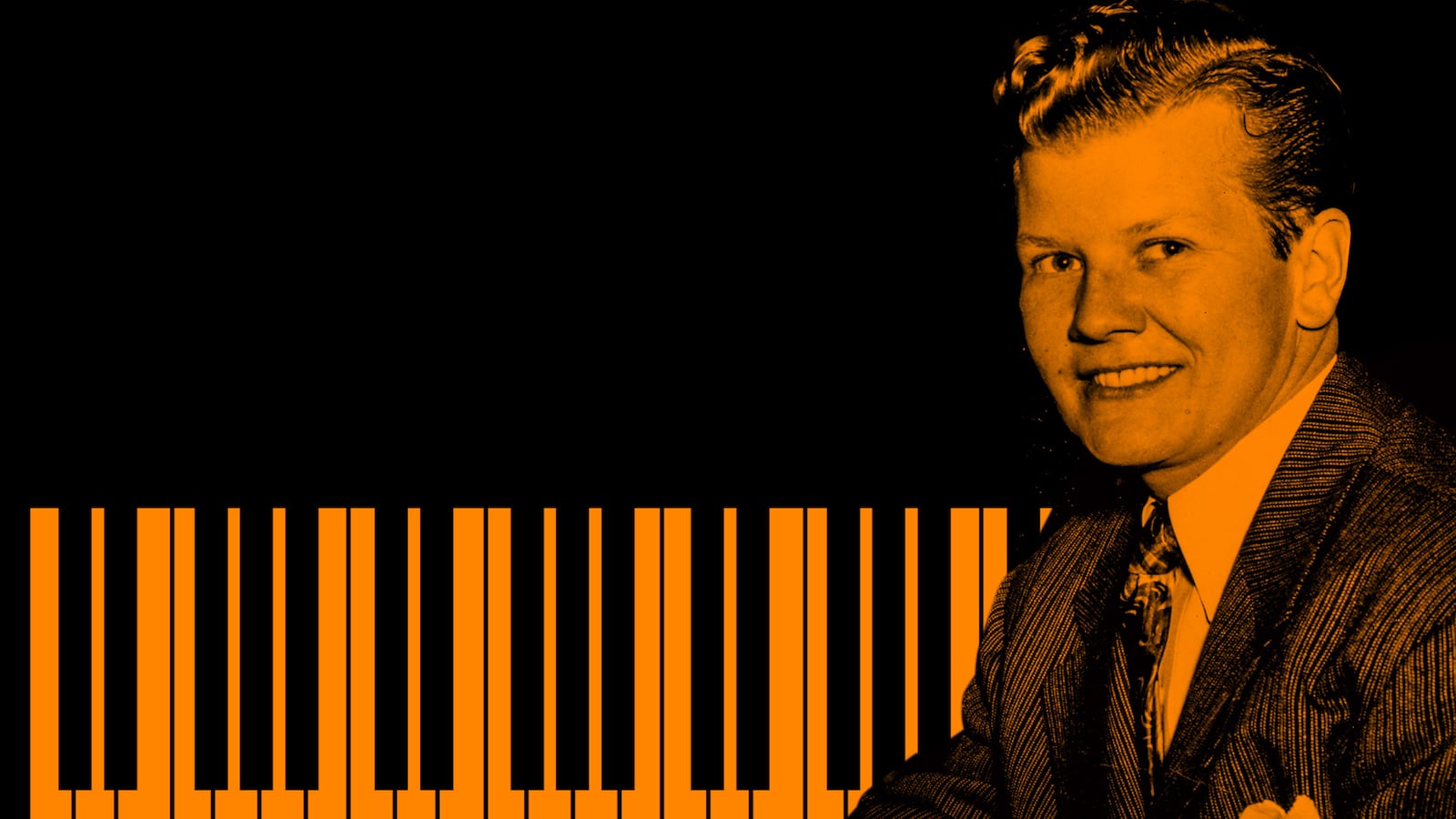Billy Tipton was what someone in No Ordinary Man respectfully refers to a “regional jazz musician.” In the mid-1930s, he fronted a band that performed on radio stations and at Elks Lodges, Air Force bases and in nightclubs, first in his native Oklahoma City and then throughout various parts of the country. He was a successful working artist, and with The Billy Tipton Trio, he recorded two jazz-standard albums and, shortly thereafter, was offered a spot playing in Reno, Nevada, as the opener for Liberace. Rather than continuing to ascend the showbiz ladder, however, Tipton retreated from the spotlight, becoming a talent broker in Spokane, Washington, where in the early 1960s he met and married dancer Kitty Kelly, with whom he adopted three sons.
True fame, however, only arrived for Billy upon his death, when it was discovered—by everyone, including Kitty and her eldest son Billy Jr., who cradled his dad as he passed away—that Billy was a transgender man.

Billy Tipton (center) and his bandmates
OscilloscopeNo Ordinary Man (in theaters July 16) is the story of Billy’s unique path, as well as of the tabloid coverage of his post-mortem outing—but to its credit, it’s more than that. Hampered by the fact that, save for some old photographs and a few audio recordings from holiday gatherings, there’s very little archival material of Billy, directors Aisling Chin-Yee and Chase Joynt take an unconventional approach to their story. Their documentary is a marriage of interviews with trans authors, activists and artists, and auditions by trans actors in which they play the role of Billy. The latter allows the filmmakers to both bring key incidents in Billy’s tale to life, and to examine the underlying dynamics and thought processes that may have been governing him at particular moments—thereby highlighting the interplay between art and fiction in comprehending and coping with real-world experiences.
Since he never openly discussed it with anyone, much less addressed it in public, no one knows what Billy really thought about his decision to live life as a man. Nonetheless, No Ordinary Man digs into tangled issues of trans identity—then and now—through the commentary of its present-day speakers. These individuals have much to say about their own processes of defining themselves and navigating a world that has trouble truly seeing them. The diversity of this group in terms of race, appearance, comportment, and outlook—as well as with regard to their takes on the same scripted scenes—serves as a subtle but powerful celebration of the trans community as a melting pot of many disparate types, all of whom are dealing with similar and exceptional struggles about who they are, how they want to present themselves (and be viewed), and the way in which art provides a conduit for those endeavors.
Billy’s saga is thus the foundation for No Ordinary Man’s grander, nuanced investigation of the historical and contemporary plight of trans men and women. To them, Billy was a veritable pioneer who confirms that, far from being a novel modern phenomenon, trans individuals have always existed. The marvel of Billy, of course, is that in an era when being trans was apt to get one killed, he chose to “hide in plain sight,” concealing that he was assigned female at birth while embracing a profession that made him the constant center of attention. That trailblazing courage is clearly an inspiration for everyone featured in Chin-Yee and Joynt’s film, who speak about his plight—and the bravery he exhibited in being himself, no matter the obstacles—with palpable reverence.
No Ordinary Man seeks to correct the historical erasure of trans experiences, resurrecting Billy as a trailblazer upon whose shoulders modern trans Americans stand. Restoring Billy’s reputation is particularly necessary because of the close-minded coverage of his death, and “outing,” in the 1990s, when Kitty and Billy Jr. made the talk-show rounds and were forced to endure all sorts of offensive questions from the guests of Oprah and Sally Jessy Raphael. In a new interview with Billy Jr., the pain of losing his father, and the intense confusion of that period, doesn’t appear to have totally diminished, and in Billy Jr.’s late meeting with author Jamison Green—who arrives wearing a hat that’s strikingly similar to one that Billy favored—the film seems to offer him some solace by showing him the enduring importance of his father’s legacy for so many.
A 1998 biography of Billy, Suits Me, by author and feminist scholar Diane Middlebrook takes a beating in No Ordinary Man, not only from interviewees—actor and artist Marquis Vilsón decries its pun-y title as disrespectful, and the tome as “a mock”—but also through a phone-conversation clip of Middlebrook unpleasantly challenging Kitty about her claims that she never knew that her husband was assigned female at birth. In that hostile and accusatory exchange, as in later conversations about 1999’s Boys Don’t Cry, the documentary considers the evolution of attitudes, and perspectives, about trans experiences both from inside and outside the trans community. It’s a portrait of understanding complicated facets of 21st-century life from different vantage points, which additionally entails recognizing the misconceptions that have long dominated dialogues about these concerns—for example, that trans men and women are “liars” because they’re pretending to be something they’re not, rather than the notion that they’re simply seeking acceptance for being their authentic selves.
No Ordinary Man grapples with these topics through a clever formal structure that maintains constant, kindhearted focus on the underlying humanity of Billy and its own speakers, whose distinctive personalities and opinions (on the dangers of visibility, the yearning for tolerance and compassion, and the performative aspects of trans identity in many environments) bolster the non-fiction study. While Billy is the nominal subject of Chin-Yee and Joynt’s film—hailed, in a long-ago newsletter read aloud by Green, as “one of our grandfathers”—he’s also the pretext for a larger look at the complexities, hardships and triumphs of trans life, which are explored here with enlivening insightfulness and empathy.


